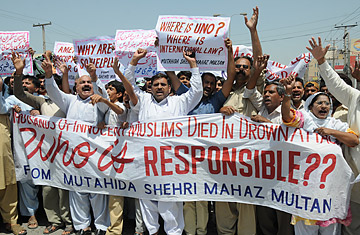
Pakistani protesters demonstrate to condemn U. S. drone attacks in Pakistani territory on Friday, April 22, 2011 in Multan, Pakistan.
(2 of 2)
Pakistan is less keen, however, on drones that targets militants it deems friendly. On his visit to Islamabad this week, Adm. Mullen said that the U.S. had "strong reservations" about the ISI's links to the notorious Haqqani network based in North Waziristan. "The reality is the Haqqani [network] is supporting, funding, training fighters that are killing Americans, killing coalition partners," he said. According to a tally by the New American Foundation, at least 24 drones have specifically targeted the Haqqani network, and even killed leader Sirajuddin Haqqani's brother, Muhammad.
Similarly, drones that have targeted Mullah Nazir Ahmed in South Waziristan and his fellow Waziri militant leader Hafiz Gul Bahadur in North Waziristan trouble the Pakistan Army. It has relied on these anti-U.S. militants in its efforts to take on the Pakistani Taliban. However, American strikes against the forces of those warlords have not elicited anything close to the current amount of vitriol.
Pakistani security officials say they are worried about the fallout from drone attacks. While they may accurately target militant leaders, the Pakistani Taliban have often invoked them as justification for attacks on Pakistani troops and bombing campaigns in the Pakistani heartland. The public, meanwhile, feels that the frequency of drone strikes — around a dozen a month, chiefly eliminating low-level operatives — is excessive.
The divergence in priorities has meant that Pakistan could never fully embrace the drone program. Any public acknowledgement of cooperation with the drone attacks would have imperiled the Pakistan army's links to friendly militants. (The U.S. cannot publicly acknowledge the covert program, either.) Those links are also why the CIA has withheld information about its strikes, only informing the Pakistanis either when the strikes were imminent or afterward. The fear is that the Pakistanis may tip-off the militants beforehand. Other concerns include injured self-esteem. The Pakistan military has long prided itself on being the ultimate guardians of the country's frontiers. Allowing a foreign power to assert itself on its soil weakens that claim.
For these reasons, it has always suited Pakistan to adopt a policy of "public denial and private acquiescence," in the words of a senior western diplomat. This was most clearly demonstrated in last year's Wikileaks dump of State Department cables. According to one cable, Gilani told U.S. officials: "I don't care if they do it as long as they get the right people. We'll protest in the National Assembly and then ignore it." After Gilani's recent anti-drone outbursts, one senior Pakistani official told TIME that the new comments should be taken in the same spirit. "Drones will continue," the official added.
But consistent public condemnation now suits Pakistan for other reasons. During the Raymond Davis affair, Pakistan's top intelligence agency, the ISI, was able to tap anti-Americanism in Pakistan to apply pressure on the CIA to end the use of contractors spying on militant groups in the mainland. Davis' killing of two Pakistanis gave them the perfect opening. The March 17 drone strike gives the Pakistan military a similar opportunity.
The incident itself is intriguing. The Pakistanis say up to 45 people were killed by the strike, including at least a dozen militants. The U.S. denies any civilians were killed. In comparison, U.S.-Pakistan relations did not suffer when Pakistani soldiers were mistakenly hit by American fire. The area involved shouldn't have surprised Islamabad: the Datta Khel section of North Waziristan had been struck by drones five times before this year alone (the last just the day before, on March 16).
By assuming a defiant, nationalist pose backed up by a populace long hostile to drone attacks, Pakistan may in fact be trying to get the Americans to concede to Islamabad a much coveted but as yet denied role in the Afghanistan endgame. The quarrel may, in fact, have little to do with drones at all.
